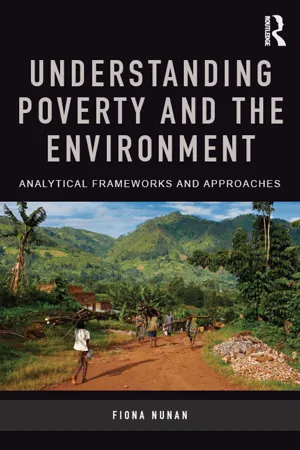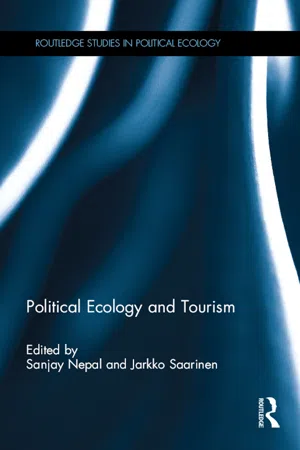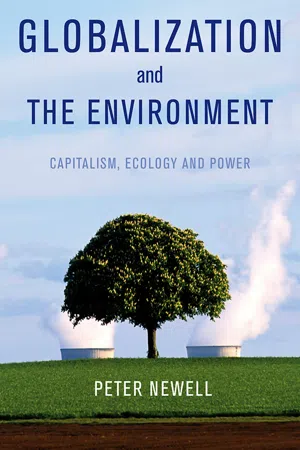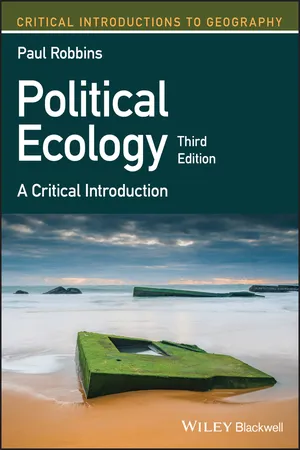Politics & International Relations
Shallow Ecology
Shallow ecology refers to an environmental philosophy that focuses on addressing surface-level environmental issues without delving into deeper systemic or structural causes. It tends to prioritize short-term, human-centered solutions over long-term ecological sustainability. Shallow ecology often overlooks the interconnectedness of ecological systems and the need for fundamental societal and economic changes to achieve true environmental sustainability.
Written by Perlego with AI-assistance
Related key terms
4 Key excerpts on "Shallow Ecology"
- eBook - ePub
Understanding Poverty and the Environment
Analytical frameworks and approaches
- Fiona Nunan(Author)
- 2015(Publication Date)
- Routledge(Publisher)
2 Political ecology IntroductionIn Chapter 1 it was suggested that relationships between poverty and the environment are complex and context specific. Being ‘context specific’ suggests that the political and economic situation matters. A multitude of political and economic factors from the household to the global level can affect how people gain and maintain access to natural resources, what benefits they derive and the condition of those resources. The influence of such factors on the status of natural resources, and on who benefits and how, can be investigated through taking a ‘political ecology’ approach.Of all the frameworks and approaches considered in this book, political ecology is particularly difficult to define and pin down. It can be viewed as an umbrella term, that is, an overarching term encompassing a diverse range of conceptual analyses and underlying assumptions. At its heart is a concern with the nature and influence of power in influencing how environmental degradation is understood, explained and manifested. In taking a political ecology approach, a researcher recognizes that natural science understanding and solutions will not suffice on their own. Science, knowledge and policy are influenced by power, political processes and economic factors – in combination forming ‘political ecology’. Political ecology has strong roots within rural environmental issues in developing countries, having been used to investigate and challenge dominant explanations of the causes of soil erosion, desertification and forest degradation. It can, however, be used in many settings, in any part of the world.This chapter reviews definitions of the term ‘political ecology’, identifies key characteristics of the approach and provides examples of its application. It then goes on to examine how environmental science and ecology is viewed within a political ecology perspective. Political ecology analysis is often premised on a critique of dominant thinking (Robbins, 2012; Stott and Sullivan, 2000). Examples of such dominant thinking are set out, with three key themes identified from these. Explanation of the political ecology critique of these themes follows. Political ecology analysis may be undertaken and presented as a ‘chain of explanation’, bringing out the local, national and global context of people–environment relations. The discussion on ‘chains of explanation’ is followed by a reflection on feminist political ecology. A more detailed example of political ecology critique of dominant thinking is then presented for the case of desertification, followed by shorter examples of application of political ecology analysis. The chapter concludes by identifying key debates and issues that have arisen within the broad area of political ecology, before a summary of key points. Box 2.1 - eBook - ePub
- Sanjay Nepal, Jarkko Saarinen(Authors)
- 2016(Publication Date)
- Routledge(Publisher)
Generally, a basic premise of political ecology is the recognition that environmental change and ecological problems are the products of political processes (Robbins, 2012). Political ecology is deemed a “term that describes a community of practice united around a certain kind of text” (Robbins, 2012, p. 20). The community in question is concerned with unequal distribution of costs and benefits associated with environmental change which reinforces existing patterns of social and economic inequalities. The inequalities are manifestations of hegemonic and entrenched power exercises, often executed by the state or similar other authoritarian regimes. The implied assumption is that the various exercises of power alter the playing field of social and political landscapes to benefit certain groups at the expense of others. Essentially, political ecology is about political implications of altered power of actors in relation to other actors (Bryant & Bailey, 1997).Political ecology examines the root causes of environmental degradation, the causes are often complex, intertwined with social, economic and political factors, both historically and contemporarily. It is argued that contemporary patterns of unequal social, ecological and economic progresses are conditioned by historical patterns of inequalities in power. The disadvantaged sections of the society are vulnerable to problems of poverty, land degradation, inadequate control and access to resources, and similar other maladies, the root causes of which lie in how resources and power are distributed and what efforts various actors make in altering the dynamics of power. As such, one of the primary domains of political ecology research is the examination of multi-scalar (i.e., local, national, regional and global) political movements of agencies (i.e., individual, community, nongovernmental organizations, and national and international governments), and their positions, interests and interactions.This introductory chapter sets the context for the book’s main theme, which is to explore how tourism issues can be examined through the lens of political ecology. The chapter begins with a brief introduction of political ecology, its definition and scope, followed by a discussion of some relevant themes that have been examined using political ecology. Of particular relevance to the contributions in this volume is the discourse on power and development, and the role of tourism in development. It is then followed by a brief summary of the current status of political ecology in tourism research, and potential future research directions. The chapter ends with a brief overview of the organization of the book. - eBook - ePub
Globalization and the Environment
Capitalism, Ecology and Power
- Pete Newell(Author)
- 2013(Publication Date)
- Polity(Publisher)
So far the story of globalization and its relationship to environmental governance could be told through critical International Political Economy (IPE) accounts drawing on historical materialist analysis of (global) environmental politics (Gale and M’Gonigle 2000; Levy and Newell 2005) and broader bodies of critical scholarship on globalization and capitalism which usefully draw attention to the social forces underpinning the project of globalization, understood as the deepening, intensification and re-scaling of capitalism (Gill 2002; Sklair 2002b; Robinson 2004). What is missing from such an account, however, is more detailed evidence of the social and environmental consequences of a global economy organized in this way and premised upon these relations of power. This is where I argue that work on political ecology can make a useful contribution, balancing the macro-focus of critical IPE and grounding our analysis of the ‘socio-natures’ (Castree and Braun 2001) that produce and are produced by globalization.Which Political Ecology?
What is political ecology and how does it help us to understand the relationship between globalization and the environment? At its broadest, political ecology seeks to provide a framework for understanding human-society or ‘socio-natural’ relations (Robbins 2004). More specifically, it examines the interrelations of politics and power, structures and discourses with the environment (see table 2.2). Here I highlight those elements which offer a bridge to critical traditions within IPE and Global Environmental Politics discussed above (and in further depth in chapter 3) (Paterson 2001b; Saurin 2001; Newell 2008c): materialist political ecologies that posit linkages between economies and the ecologies of which they are a part. For example, the global political ecology that Peet, Robbins and Watts engage in ‘emphasises global political economy as a main causal theme’ (Peet et al. 2011: 23). For them:Political ecology is predicated on an ecologically conceptualised view of politics: it is attentive to the hard edges of capitalist accumulation and global flows of labour, capital and information, but also attuned to the complex operations of power-knowledge . . . all within a system prone to political-economic crisis (Peet et al. 2011: 23).It is a research agenda that coalesces around the impact of capitalist development on the environment, as well as its emergence through particular socio-natures. It centres both on the social and political implications of prevailing practices of environmental protection and management, and the political economy of the way ‘new natures’ are produced. Such lines of enquiry have been pursued through work on the practices of commodification of ‘neo-liberal natures’ (Castree 2003, 2008; Budds 2004; Mansfield 2004, 2007; Bakker 2005), as well as through ‘classic’ political ecology concerns with questions of access to material and natural resources, and issues of resistance, equity and justice in the negotiation and distribution of social and environmental benefits at multiple scales (Peluso 1992; Bryant and Bailey 1997; Paulson et al. 2003; Zimmerer and Bassett 2003). - eBook - ePub
Political Ecology
A Critical Introduction
- Paul Robbins(Author)
- 2019(Publication Date)
- Wiley-Blackwell(Publisher)
Even so, as it is generally practiced, the eclecticism of political ecological explanation defies efforts to represent it as anything like a single theory or a body of theory. Rather than a specific set of overarching categories or claims, political ecology instead mobilizes concepts from broader schools of thought to explain otherwise confounding socio‐environmental outcomes. In many cases, moreover, political ecology focuses heavily on case studies that stress idiosyncrasies, contextual outcomes, and local surprises that precisely fly in the face of general theory‐building. Political ecology, therefore, utilizes and supports theory‐building to an enormous degree, but it would be grossly misleading to call it a body of theory.Given this eclecticism, it might be conversely tempting to assert that political ecology is instead a kind of method: something that people do (Robbins 2004 ). Political ecologists typically operate from case studies, often using immersive techniques to understand both values and practices of people, within households, communities, and localities. Participant observation techniques are common, as are survey instruments. This approach reflects the field's deep roots in development‐oriented research in small communities, where anthropological and geographic field techniques were typically ethnographic. These are further analyzed in a comparative fashion, stressing how local knowledges and practices, along with their social networks and ecologies, are impinged upon by political and economic upheaval – commodity price changes, the implementation of conservation reserves, or the introduction of new markets, contracts, or technologies. That analytic, as a sort of methodological procedure, constitutes some significant slice of political ecological work.But a more extensive examination of political ecology challenges any such claim. Political ecology includes the use of remote sensing technology and time series analysis of landscape change (Brannstrom and Vadjunec 2013 ). It includes integration of biogeophysical and social sciences with the humanities to explain agrodiversity (Zimmerer et al. 2017 ). It includes extensive archival research in colonial record offices or the basements of government agencies (Davis 2016 ; Sayre 2017 ). It includes network analysis of inter‐linkages between institutional actors (Howard 2009
Index pages curate the most relevant extracts from our library of academic textbooks. They’ve been created using an in-house natural language model (NLM), each adding context and meaning to key research topics.



